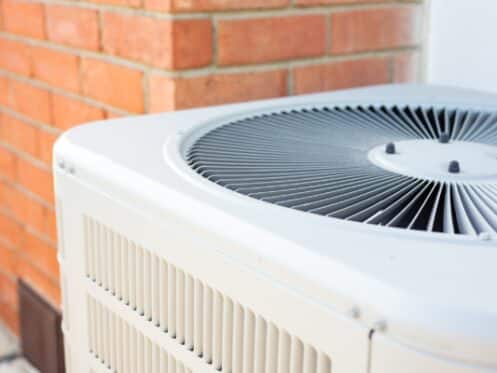If you’re looking to replace or upgrade your HVAC system, you’re in luck as there are new tax credits available that can help you save quite a bit. These tax credits were created as part of the 2022 Inflation Reduction Act. They allow you to get up to a few thousand dollars back when you purchase and install a new qualifying heat pump, air conditioner, furnace, or biomass boiler. The tax credits also cover certain high-efficiency appliances or appliances that have received upgrades to improve their home’s energy efficiency. The Inflation Reduction Act also established a separate rebate program, which can help you save up to $8,000 when you purchase a new electric heat pump or make other home energy-efficiency improvements.
How the Energy Efficient Home Improvement Tax Credit Works
The Energy Efficient Home Improvement tax credit is available to anyone with a single-family home who has a qualifying HVAC unit installed any time between January 1, 2023, and December 31, 2032. This program allows you to earn up to a $3,200 tax credit each year. You can claim this amount when you file your taxes the next year.
The program is split up into two parts. You can earn up to $600 or $1,200 total credit for installing a high-efficiency furnace and air conditioner if the new units meet certain criteria. This $1,200 credit can also apply when you make some energy-efficiency improvements, such as upgrading your windows and doors or having your home insulated. Qualifying furnaces and air conditioners are each eligible for a tax credit of up to 30% of the total installation cost, but this credit is capped at a maximum of $600 per unit. The cap for other home energy-efficiency improvements is $1,200 or no more than 30% of the total cost of the work.
The second part of the program applies to new electric heat pumps, heat pump water heaters and biomass boilers, and the tax credit for these units can be worth up to $2,000 a year. As with the other units, this credit is capped at 30% of the total purchase and installation cost for each new unit.
When applying for the tax credit, your tax filing must include the invoice to prove how much you paid and to show that your new unit meets the specific energy-efficiency criteria. Only units that qualify for the Consortium for Energy Efficiency’s highest efficiency tier qualify for these tax credits. This means that the unit must be ENERGY STAR-rated and also meet specific requirements in terms of SEER2 (Seasonal Energy Efficiency Ratio), HSPF2 (Heating Seasonal Performance Factor) or AFUE (Annual Fuel Utilization Efficiency).
A new air conditioner is eligible if it is at least 17 SEER2, whereas heat pumps must be at least 18 SEER2 and 10 HSPF2. For gas furnaces to qualify, they must have an AFUE of at least 97%. However, these minimum ratings are only for the current year and will most likely increase in the next few years.
The Consortium for Energy Efficiency updates the requirements for its various efficiency tiers each year. In addition, the tax code states that units only qualify for a tax credit if they meet the requirements for the highest efficiency tier that were established at the start of the current year. In more basic terms, a unit that qualifies for the highest tier this year may not qualify in future years since the requirements for the highest tier can increase from year to year.
For this reason, we recommend not waiting to have a new unit installed if your current one is having lots of issues or nearing the end of its life. You will still be eligible for the tax credit if you replace your unit anytime in the next decade. Remember, though, that you may not save as much in future years if the requirements increase and you need to buy an even more efficient unit to qualify.
How the High-Efficiency Electric Home Rebate Program Works
The High-Efficiency Electric Home Rebate program is slightly different as it is not a tax credit but a rebate paid out by the state government. The US federal government has a total of $4.4 billion to fund the program, which is distributed to individual states based on population. The states must then establish the program and distribute the money to families that qualify. The rebates available through this program can stack with the tax credits, which means you may be eligible to claim both.
As each state is responsible for its program, the specific timeline of when the rebates will be available varies. The rebates should be available in most states by the end of 2023, and states have to start distributing them by the end of August 2024, or else they will forfeit the money, and it will be distributed to other states.
Unlike the tax credits, these rebates are partially based on income level. All single-family households can qualify as long as they earn no more than 150% of the average annual income in their area. However, only low- and middle-income families that earn under 80% of the average income will receive the full rebate. If your income is between 80% and 150% of the average, you will only be eligible for half the total amount.
Under this program, any new electric heat pump is automatically eligible for a rebate of up to $8,000 or $4,000, depending on your income level. Heat pump water heaters qualify for a rebate of up to $1,750. There are rebates for electrical and breaker panel upgrades, home weatherization, heat pump clothes dryers, and some electric stoves. In total, each single-family household can claim up to $7,000 or $14,000, depending on their income level.
One great aspect of this rebate program is that all electric heat pumps qualify for a rebate. This is because, unlike the tax credit program, the rebate program does not have any specific energy-efficiency requirements.
Retroactive 2022 HVAC Tax Credits
The Inflation Reduction Act also established a retroactive tax credit for people who had certain qualifying HVAC units installed at any time in 2022. Unfortunately, these retroactive tax credits aren’t nearly as much as the new credits. Still, you may be eligible for a credit of either $300 or $500, depending on the type of unit you installed and its energy-efficiency rating. However, you will need to apply for the credit when you file your taxes as the retroactive credit expires at the end of this year.
Fresno’s HVAC and Plumbing Experts
If you need to upgrade your home with a heat pump or need a new furnace, air conditioner or water heater, Allbritten is here to help. Our team can assist you in choosing the right unit for your home and also help to ensure that whatever new unit you choose qualifies for the tax credit or rebate program. In addition, we can perform a home energy audit to help you find ways to improve your home’s energy efficiency so you can save even more. If you need any plumbing, heating or cooling repairs or maintenance, we can take care of that as well. For more information, give us a call today.


